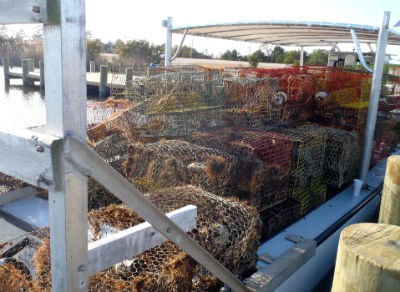PINE KNOLL SHORES — A chapter of the world’s oldest and largest organization dedicated to fisheries will present one of its annual awards to the N.C. Coastal Federation, an environmental nonprofit group, for its work to restore marine habitats.
The Tidewater Chapter of the American Fisheries Society will present the federation its Conservation Award at its 29th annual meeting today at the Pine Knoll Shores Aquarium.
Supporter Spotlight
The Conservation Award is given to people or organizations that have distinguished themselves through notable acts of fisheries or habitat conservation.

Made up of more than 9,000 fishery scientists from around the world, the society works to advance sound science, promote professional development and disseminate science‐based information for the global protection, conservation and sustainability of fisheries resources and aquatic ecosystems.
“I’m pleased that we’re able to recognize their good work,” said Ronald Klauda, chairman of the society’s awards and scholarship committee. Klauda has been a member of the American Fisheries Society for almost 40 years.
“We’re fisheries, but we know everything that comes off the landscape, through wetlands and so forth, down rivers and streams, is all connected,” he said. “[The federation] works with the fishing industry and does a lot with cleaning up derelict fishing gear, repurposing crab pots for oyster reefs habitat.”
The federation also restores wetlands and educates people about habitat conservation, Klauda said. And, it works extensively to address stormwater runoff, which is poisoning coastal waters.
Supporter Spotlight
“I think there are probably a small segment of people involved with fisheries who see anything that doesn’t involve ‘harvest as many as you can’ as maybe a threat. Though most people are more enlightened these days, and they understand the importance of habitat,” Klauda said.

Protecting coastal waters and marine habitats have been the primary focus of the federation since its founding in 1982, noted Todd Miller, the federation’s founder and executive director. “Many years ago a wise fisherman stressed the vital importance of keeping our estuaries healthy and productive,” said Miller. “He said if you can’t hatch them, you can’t catch them.”
A future with healthy fish stocks, Klauda says, relies on conservation work. “There’s no evidence I can see really that our stocks are necessarily going to improve on their own.”
He listed several reasons why that is, including a growing global population, the overexploitation of commercial fish stocks, changes to landscapes that are polluting spawning and nursery areas and a shifting distribution of fish stocks due to climate change.
“I see conservation as having a bigger and bigger role as we realize there are more threats, and we need to do things or we’re going to be, you know, in dire straits,” Klauda said.

Lexia Weaver, a coastal scientist who manages habitat restoration projects for the federation, will accept the award on behalf of the federation staff that gets its feet wet restoring oysters, wetlands and water quality. “We appreciate the expertise and the management expertise provided by association,” she said. “Their work makes our work easier and much more effective.”
Rachel Bisesi, one of the federation’s educators, and Sam Bland, the federation’s coastal specialist, will join Weaver in receiving the award.
The Tidewater Chapter is made up of members of the fisheries scientists from North Carolina, Virginia, Maryland and Delaware. Each year the chapter rotates between states to hold their annual meeting and highlight the work of local people and organizations.
Today the chapter will also presented their Excellence in Fisheries Education Award to Philip “Skip” Kemp, Jr. Skip recently retired but for many years was the head of the aquaculture technology program at Carteret Community College.







